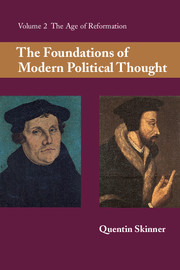Book contents
- Frontmatter
- Contents
- PART ONE ABSOLUTISM AND THE LUTHERAN REFORMATION
- PART TWO CONSTITUTIONALISM AND THE COUNTER REFORMATION
- 4 The background of constitutionalism
- 5 The revival of Thomism
- 6 The limits of constitutionalism
- Further Reading
- PART THREE CALVINISM AND THE THEORY OF REVOLUTION
- Conclusion
- Further Reading
- Bibliography of primary sources
- Bibliography of secondary sources
- Index
4 - The background of constitutionalism
Published online by Cambridge University Press: 05 June 2012
- Frontmatter
- Contents
- PART ONE ABSOLUTISM AND THE LUTHERAN REFORMATION
- PART TWO CONSTITUTIONALISM AND THE COUNTER REFORMATION
- 4 The background of constitutionalism
- 5 The revival of Thomism
- 6 The limits of constitutionalism
- Further Reading
- PART THREE CALVINISM AND THE THEORY OF REVOLUTION
- Conclusion
- Further Reading
- Bibliography of primary sources
- Bibliography of secondary sources
- Index
Summary
‘Had there been no Luther there could never have been a Louis XIV’ (Figgis, 1960, p. 81). Figgis's epigram has been criticised as unhistorical, but there is no doubt that the main influence of Lutheran political theory in early modern Europe lay in the direction of encouraging and legitimating the emergence of unified and absolutist monarchies. Luther's doctrines proved so useful for this purpose that his most distinctive political arguments were eventually echoed even by the leading Catholic protagonists of the divine right of kings. When Bossuet, for example, came to address his major political work to Louis XIV's heir in 1679, he based his entire discussion on the typically Lutheran assumption that all political principles must be derived from the pages of the Bible, entitling his treatise Politics Taken from the Words of Holy Writ. Moreover, in analysing the concepts of political authority and obligation, he laid a very strong emphasis on both the doctrines which we have already seen to be most characteristic of early Lutheran political thought. When he considers ‘the nature of royal authority’ in Book IV, he maintains that the power of the king must extend to judging all causes, ecclesiastical as well as temporal, and that his power itself must be absolute, since ‘there is no one to whom the king is accountable’ (pp. 92–4).
- Type
- Chapter
- Information
- The Foundations of Modern Political Thought , pp. 113 - 134Publisher: Cambridge University PressPrint publication year: 1978



